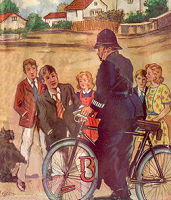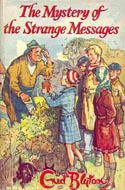
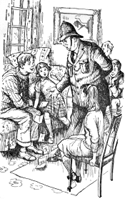
Fatty is VERY interested to hear of Mr Goon's complaint about anonymous messages.
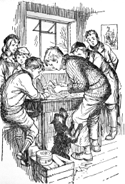
The Find-Outers go over the strange messages on by one.
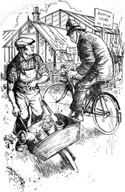
In his search for information about The Ivies, Mr Goon bumps into a gardener.
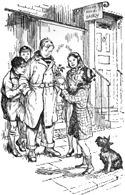
Bets buys a plant and plans to ask Mr Grimble what kind it is.
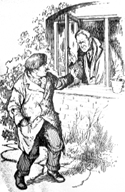
A disguised Fatty is caught snooping around The Ivies.
The Mystery of the Strange Messages
Review by Keith Robinson (February 18, 2005)I found the fourteenth mystery to be one of the most enjoyable since The Mystery of the Vanished Prince. It has a number of silly flaws, but for the most part it's exciting and, towards the end, action-packed. Just who is leaving strange messages around Mr Goon's house? What do the messages mean? The Find-Outers are quickly on the trail—but the mystery doesn't end there, and that's part of what makes it work so well for me.
I found the opening chapter a little sloppy, to be honest. Something about the way it was written, repetitive phrases and poor construction, such as: He took one of the envelopes and looked at it. It was a very cheap one, square in shape, and on each one was pasted two words only. This goes from talking about one envelope to all the envelopes in the space of one sentence. There are a few other similar examples which stood out to me. Also, Mr Goon observes that the sender of the messages must be poorly educated because the envelopes are addressed "Mr goon" with a small "g"...but this is a silly observation since the words are cut and pasted from newspapers, where a capitalized "Goon" would be hard to find. His logic fails there, although admittedly this is Mr Goon we're talking about!
In this same chapter, Mr Goon is angry about the notes and questions his housekeeper, Mrs Hicks, to see if she saw anyone hanging about outside. She said she saw no one but the butcher boy—and Mr Goon immediately jumps to the conclusion that it must have been that toad of a boy Frederick Trotteville! Okay, so again this is Goon we're talking about...but SURELY he would have thought to speak to the butcher boy to check this story BEFORE going round to Fatty's and throwing the notes in his face! So once again, Mr Goon hands Fatty the mystery on a silver platter and I can't help wondering how many times Enid Blyton has done this throughout the series.
In chapter two, Bets asks Fatty what "anonymous letters" are. Er...didn't we cover that in The Mystery of the Spiteful Letters? This is partly why I had reservations as I started this book; it seemed that Enid Blyton had lost her way a little. But I'm happy to say that, despite these niggling little annoyances, the mystery turned into a right riveting read!
The notes show up throughout the mystery and read as follows:
- TURN HIM OUT OF THE IVIES!
- ASK SMITH WHAT HIS REAL NAME IS.
- CALL YOURSELF A POLICEMAN? BETTER GO AND SEE SMITH.
- WHY DON'T YOU DO WHAT YOU'RE TOLD, EGG-HEAD?
- WHEN YOU SEE SMITH, SAY 'SECRETS' TO HIM.
- ASK SMITH AT FAIRLIN HALL WHAT HIS REAL NAME IS.
- FOUND OUT ABOUT SMITH YET, YOU DUNDER-HEAD?
All the notes use the same cut-and-pasted letters, are addressed to "Mr goon," and are left lying around on his window sill or out in the garden. Whoever's leaving the notes must be invisible, because Mrs Hicks never sees anyone—so Mr Goon calls on good old Ern and pays him to stay and keep watch. In chapter sixteen Daisy (of all people!) has a brainwave and realizes who might be leaving the notes—and that little mystery is promptly solved. But there's more to come. The question of who sent the notes becomes secondary to the question of why, and this is where the real excitement kicks in.
Searching for houses called The Ivies is a good first step, but there aren't any—so the Find-Outers assume it was house once called The Ivies and now called something else. They eventually come across Fairlin Hall, hence the sudden change in the notes (it seems the writer realized the house wasn't called The Ivies anymore at the exact same time Fatty found out which house the notes were talking about—but if Fatty had known it was Fairlin Hall in the first place a good chunk of the book would have been missing).
Mr Goon's eviction of poor Mr and Mrs Smith is both nasty and questionable. Mr Smith does indeed have a shady secret, but this alone is no reason for Mr Goon to tell the couple to leave the house immediately. First, he has no legal right. Second, the couple are old and sick and have already paid for Mr Smith's wartime crime. Third, Mr Goon seems to have missed the point and done exactly what the message writer wanted all along! The man's a complete imbecile! But kudos to Enid Blyton for a very touching scene when Fatty and Ern arrive to find Mr Smith lying on the floor, very ill...The boys call for an ambulance and make temporary living arrangements for Mrs Smith.
The ending is very dramatic, with plenty going on. It reminded me a little of the ending to Vanished Prince, when all hell let loose—except this time it was Ern that caught the bad guys and saved the day! Hurrah!
Finally, to return to the envelopes that were addressed to "Mr goon." There's a staggering set of coincidences involved here. The word "goon" is not made up with individual letters, or small words such as "go" and "on"...No, it's actually one piece, "goon," which must have come from something like...well, Mrs Trotteville suggests "Rangoon" in Burma. I wonder if there are any more possibilities? But anyway, the only way for the bad guys to get the Smiths out of that house is to send anonymous notes to the local bobby, and his name is unfortunately Goon, not exactly very common...so it's truly a marvellous coincidence that, in fact, one of the bad guys has recently returned from Rangoon, Burma, bringing with him newspapers called The Rangoon Weekly. Whew!
Finally—it's odd to me how no more mention is made of the person who actually left the notes. Surely that person deserves at least to be charged for wasting police time?


